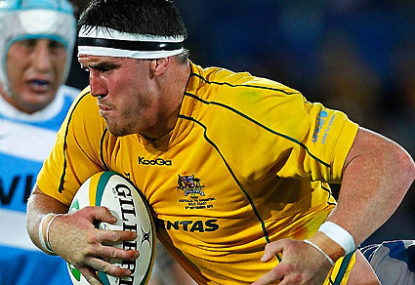Like many of you, I choked on my cornflakes at the news earlier this week that plans were afoot to wedge Kane Douglas back into the Wallabies setup ahead of the Rugby World Cup.
Douglas, you’ll remember, left Australia last season for a three-year deal with leading Irish club Leinster.
There were suggestions that after a very strong championship season with the Waratahs, not enough was done to keep Douglas in Australian rugby.
In April this year, the ARU implemented its eligibility policy, whereby overseas-based players with more than 60 Tests under their belt and who had played at least seven seasons of professional rugby in Australia would now be eligible for Wallabies selection.
At the time, I wrote that the ARU was being “very clever and careful” in its ‘60+7′ policy shift, and that they should be applauded for setting the criteria at the levels they did. The ’60+7′ policy ensures that only the best Australian players overseas become available, and more importantly that Australian rugby gets the benefit of the crucial development years of a player.
60+7 is how Matt Giteau and Drew Mitchell are now back in Wallabies camp, and also how the door remains wide open for another George Smith return.
However, Douglas, right at this point in time, does not meet that eligibility. He has played just 14 Tests, and falls short of the seven-year criterion after debuting for the Waratahs in 2010.
So how on earth is this going to work? And why does it appear that the ARU’s application for a World Rugby Regulation 9 release for Douglas this international season is in direct contradiction of their own policy, only three months into its implementation?
Well, like all good stories, there’s a little more to this than meets the eye. The key element was a quote from Michael Cheika from the Wallabies’ camp.
“I’m hearing there’s some noise he wants to come home,” Cheika told reporters. “If he is coming back to Australia to play and signs with an Australian Super Rugby team, of course we’d be interested in providing a top-up. But I think he’s still in contract in Europe.”
Leinster don’t think that he’s still in contract, they know he is; although they have signalled an intent to comply with the Regulation 9 request, their position beyond the Rugby World Cup was pretty clear, too.
“We have been in discussions with the Australian Rugby Union and with Kane for a few weeks now and we have made our position clear,” Leinster team manager Guy Easterby said in a club statement yesterday.
“Kane is contracted to Leinster for another two seasons and we look forward to welcoming him back when his commitments with the ARU come to an end.”
The only way Douglas can become eligible for the Wallabies this year would be via another slight policy shift, also announced back in April.
Lost among all the talk of ‘Giteau’s Law’ was a tweak to the policy for returning players:
“Under the revised policy, players returning to Australia from overseas who make a two-year commitment to an Australian Super Rugby club will also be eligible to represent the Wallabies immediately upon their return,” the policy stated.
Like Dean Mumm, Douglas would need to sign at least a two-year Super Rugby deal with an Australian side to become eligible immediately. The Queensland Reds have been mentioned, and would be an obvious solution, with the mail suggesting that Douglas wants to come home to be closer to his family.
Older brother Luke plays NRL with the Gold Coast Titans, and the family hail from the NSW far north coast. Their mother, Trish, lost her battle with cancer in mid-2013. Douglas announced his engagement over the weekend, and he and fiancée Jennarly are now also expecting their first child. It’s certainly the time of your life you’d want to share with family.
So the question then becomes one of the Leinster contract. Gloucester and former Brumbies coach Laurie Fisher told me in late April that the new ARU policy would almost certainly force European clubs to rethink the recruitment of Australian players, particularly the increasing number eligible under 60+7. Why recruit players who will then be missing during the international windows?
But since Douglas doesn’t qualify, Leinster would be within their rights to expect their contract to be honoured. But then, what’s the point of keeping a player who doesn’t want to be there?
So what happened first, the Regulation 9 application, or the “noise he wants to come home”?
And what of the remaining two years under contract? Leinster would want something in compensation if they were to release Douglas, but just like Quade Cooper’s deal-or-no-deal with Toulon, who pays the reported buyout figures?
My ARU source yesterday told me unequivocally that the financially perilous board “wouldn’t be paying a cent” on either deal. And given the Reds’ position on Cooper’s situation, they can hardly turn around and now offer to reimburse Leinster, can they?
Cheika’s “of course we’d be interested in providing a top-up” words were interesting, too. If Douglas wasn’t worthy of a top-up a little over 12 months ago – the major reason for his departure, we were told – then is he really worth one now, 20-odd games and a back injury with Leinster later?
Not to mention the dearth of lock options in Australia suddenly. Sam Carter is injured, and no room could be found for Luke Jones, Adam Coleman, or even Lopeti Timani in the 40-man Wallabies squad. “Of course we’d be interested in providing a top-up.” Really?
Having dug a little deeper, I’m satisfied that no policies – infant policies at that – are being bent, but there are bigger questions that need to be answered.
Like do the Wallabies really need Kane Douglas? Is the coach’s interest in providing an ARU top-up on return shared by the board? And who is really driving this sudden development?





























































































